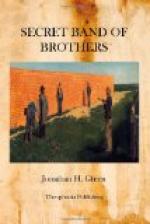Mr. Green considered the bowling-alleys and billiard rooms as the very bane of the city—leading men on step by step to the vices of gambling and drunkenness. Mr. Green stated that he had never met with a gambler in his life, who played honestly, and got his living by playing cards honestly—for all he had ever known would take advantage, sometimes—which perhaps the world might call cheating. Mr. Green practically illustrated with a pack of cards the modes of taking advantage, (cheating in plain English,) that were truly surprising. Mr. G. said that such things were done by gamblers, called honourable, and if any one had charged such men with dishonesty, why a duel, or worse, might have been the consequence.
On one occasion, he (Mr. Green) had been cheated out of several hundred dollars by a brother gambler. He knew it, but lost his money and said nothing—at length, he found out the method of cheating—and went home and set up all night by way of studying a cheat that would recover his money and more. He succeeded at last, and went and won all the money of his antagonist and party—in fact, he won enough to break the whole party. Mr. Green then showed by cards how he had been engaged in winning (by tricks) money from a planter in Louisiana.
Mr. Freeman replied, and contended that Mr. Green had referred to only a few mean gamblers—and by his inference charged their practices upon the whole body. But our limited space warns us to be brief. Mr. Freeman only contended that a gambler was honest in a relative point of view—as honest as other men who in trade or otherwise, or in speculation, did things as bad or worse than gamblers. Mr. F. related anecdotes to show that persons charged with faults and crimes were almost always condemned by public opinion, and their faults and crimes exaggerated. Mr. F. stated that in former times, the keepers of gaming-houses in New Orleans paid heavy licenses, and were subject to ruinous fines if they cheated in the smallest degree.
Mr. F. contended that cheating at cards was decidedly a disadvantage to the gambler—because, if he lost his character as a fair man, people would not play with him, and so cheating was to him a loss: on the principle of a man in England, who said he would give a hundred thousand dollars for a character. “Why?” asked his friends. “Because,” replied the first, “because I could gain two hundred thousand dollars by it!”
Mr. F. introduced several anecdotes. Mr. F. had heard several sensible men in New Orleans say, that if gaming-houses there were licensed, there would be little or no cheating, because those houses would be under the police, and people could not then do as they now do in holes and corners. On the principle of “Vice is a creature of such hateful mien,” &c. &c., Mr. F. thought that Mr. Green, by showing and explaining some of his tricks, would be likely to tempt some persons to practise such tricks, if they wanted a little money; and on this point he would quote Scripture, and say—“Lead us not into temptation!”




